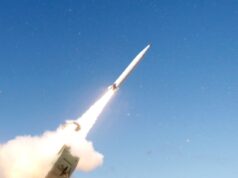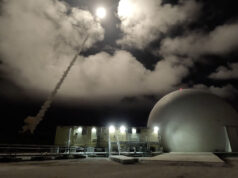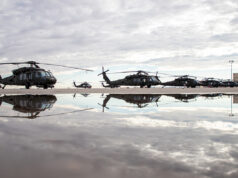The U.S. Marine Corps has awarded BAE Systems a contract modification for the second lot of full-rate production of Amphibious Combat Vehicles (ACVs).
The contract award of $169 million is for 33 vehicles.
According to BAE Systems here, the ACV is capable of conducting rapid ship-to-objective manoeuvres and delivering enhanced combat power to the Fleet Marine Forces.
“BAE Systems is dedicated to helping the Marines meet their expeditionary and Force Design 2030 needs,” said John Swift, director of amphibious programs at BAE Systems, referring to the U.S. Marine Corps’ force structure goal for combat operations in a rapidly-evolving future environment.
“This follow-on contract is a testament to our commitment of getting this critical capability to the warfighter and supporting the Marine Corps’ priorities.”
BAE Systems is already under contract to deliver two variants of the ACV Family of Vehicles to the Marine Corps: the ACV personnel variant (ACV-P) and the ACV command variant (ACV-C). The company has also received a design and development contract for a 30mm cannon variant (ACV-30), and a recovery vehicle (ACV-R) is also planned.
In addition, BAE Systems has received task instructions from the U.S. Marine Corps to complete a study of incorporating Advanced Reconnaissance Vehicle Command, Control, Communication and Computers/Unmanned Aerial Systems mission payload into an Amphibious Combat Vehicle (ACV) variant.
BAE Systems was awarded the first full-rate ACV production Lot 1 contract option in December 2020 for the first 36 vehicles and the second option in February of 2021 for an additional 36 vehicles.









Pound for pound the best ground – air combat force in the world. By a very large margin.
Perhaps so, but they wouldn’t get very far without the support and logistics of the USAF and USN. That is something that seems to get lost when debating their effectiveness. They would need a much larger budget to do all those things alone.
I think USN definitely USAF not so much.
Fair point.
USN and Marines with those C17’s and C5’s huh?
USAF with their LHD’s, LPD’s ? The USMC are an Amphibious force. C17’s and C5’s nice but non-essential.
Non essential??
Yes.
Okie dokie ! if you say so!
If the USMC deploys a MAG for example how much of it do you think will come by LHD and LPD and how much by C17’s or C5’s ?
USAF have amphibious C17’s obviously
Jay, now that would be something to see. Imagine, that a C17 flying boat, a Sunderland on steroids!
The US have been carrying out development work on C130 with floats for supporting the USMC, so not quite so daft. I’m sure the Hybrid Air Vehicles Airlander 10 & 50 airships would also fit right in.
What’s that huge Russian aircraft with 6 – 8 engines, lands and takes off from water? Ah yes the Beriev Be-200 Altair. It’s main purpose is as a water bomber for fires, but could be used to transport troops and materiel, I guess.
Correction – the Beriev has two turbofan engines…
Along with L-M might be checking out an amphibious F-35.
That’s not really the big picture. After the USMC have burned through their ammo etc. How do they get resupplied? Yes there are stores on ships, but that can only supply them so long. The USAF will be doing constant shuttle runs for resupplies.
Yes but then you get into infinite possibilities of scale, distance from supply bases and intensity of combat. Added to that what would be the other demands on air supply from Army and Airforce in any given situation. I’m standing by my point the USMC supplied and supported entirely from the sea would be perfectly capable of carrying out sustained combat operations.
But only in a no AShM environment.
USMC are very rarely been entirely supplied from the ocean alone, ww2 accepted as there was no USAF until 1947.
None of it if it was deployed to a land locked country like Afghanistan.
Well, funny you should mention it, but wasn’t there a debate a few years ago, that the UK armed forces should be combined and organised more along the lines of the USMC?
In many ways it would make a lot of sense.
Hi Ron, see what I said to SwindonSteve. My first thoughts.
Can’t see that working. Means you would ditch the Independent nuclear deterrent, all surface ships, all submarines, all strategic air transport, all air superiority fighters (Typhoon), air tankers, tanks (USMC just about to get rid of them now).
But you would have an excellent and very well funded and manned replacement for 3 Cdo Bde.
No, you misunderstand. The proposal as I read it wasn’t to dispose of capability you mention, but to organise as a combined arms expeditionary force. Air – Land – Sea.
It was a good decade ago mind when I read about it.
Too many objections from the various arms for it to ever happen, although, it does have some merit.
Maybe a solution would be to form the RM as a fourth service. Say instead of 1/3 allocate 30% of budget to each existing service with remaining 10% to RM. Total pipedream of course but nice to dream.
The army could not afford to contribute – they need every penny they can get to modernise their own equipment.
I presume you want to see the RM as more than a single brigade? Is there the work for, say, two commando brigades?
The Army and the RAF would definitely not be happy. The RN would probably be happier for the obvious reason that they have less to lose financially. That’s why it’s a pipedream. Let’s go with it though I would see an expanded RM as having future commando force plus a fully functional Amphibious Brigade with an increased Helo component for both.
I think it’s actually not a bad idea either, perhaps it could be tested on a smaller scale.
The LRG’s still don’t make any sense whatsoever to me, especially the Northern one that will only ever realistically operate against a peer opponent (Russia) in an area denial environment. Raiding is the domain of small groups of special forces deployed from submarines, not from stonking great radar targets.
I think in modern warfare it’s going to be heavily influenced by getting their ‘firstest with the mostest’ and establishing area-denial before your opponent. The fastest deploying fighting units are those like 16AA the 3Cdo but they are heavily outgunned by their equivalent Russian counterparts (see Russian Airborne deployment to Kazakhstan with their IFV’s for example). They also don’t any area denial equipment such as mobile AShM launchers or CAMM.
Instead the LRG’s could be combined arms and used to forward base a small entry unit of the Army’s heavy equipment such as Challenger 3’s, CAMM and ideally some new very small mobile AShM launchers like the US Marines are getting.
That way if it all kicks off you can quickly deploy small numbers of heavy kit and large numbers of elite light infantry to remote terrain that will quickly overmatch any equivalent Russian force. The units can set-up mobile air defence and anti-ship missiles that would deny theater access to heavier Russian deployments while the LRG can move on to the next strategic location to rinse and repeat.
Mobile forward deployment. I’d be the first person to say I’m not very clued up though so maybe this already happens or it’s just not that clever for a reason I’ve missed.
See the link below link, regards to Russia Brigade Combat Team (BCT):
2Fiore17.pdf (army.mil)
This is how part of their forward deployed units operate. However, they still their very large mechanised infantry etc divisions. These operate in a similar concept to a strike brigade, but are much heavier equipped. They usually constitute a force of 800 to 900 personnel, that includes MBT, IFV, SPG, mobile Air Defence, Sigint with ECM and combat engineers. At present there are some 40+ of these units arranged around Ukraine’s eastern border with Russia and Belarus.
From some of the stuff I read, they rely on the mechanized division to punch a hole, through which they will race to capture ground. However, as the study says, it doesn’t always work. As this is merely a transitional organization for the Russian Army as they re-equip with more up to date equipment.
Cheers, fascinating read. I wonder if the units they’re deploying away from Donbass and Luhansk (e.g above Kiev) are BTG’s, considering that they won’t have local militia available in those areas to fill the infantry screening role.
Yes BTGs (I saw quoted at least 5000 troops from the Far East) plus extra AD (S-400) and Iskanders as well it seems as Army level very heavy artillery and ECM. Whilst they have exercises running almost continuously, unlike the West, this one is a very big test of the Russian military. Perhaps more realistic than expected as someone brought down the computers in the Belarus Railway system, causing reversion to a manual system. Probably not what the perpetrator intended.
Based on the article you linked they were screening their BTG’s in Donbass with separatist militia infantry, without that infantry their BTG’s were over-stretched. I can’t imagine that kind of militia will be available to them outside of the separatist Ukrainian regions and the fronts are too big for mercenaries to fill the gaps. You’d think if they were serious about invading you’d be seeing a lot more infantry in the BTG’s closer to Western Ukraine no?
Daveyb link not mine. The general view is that the estimated 45,000ish soldiers that the DNR and LDR have trained up in the past 6 or so years are competent enough with their armour and the support of the Russian heavy weapons over the border, to hold off and then push back the Ukrainian Army. As you say, there is no equivalent force anywhere else around Ukraine. All the Russians seem to be doing in Belarus is one of their normal exercises but testing their ability to scale it up, as NATO does sometines. I assume that this lack of manpower is one reason why the Ukrainians/Germans/French militaries are saying that they see no ‘strike’ type BTG beyond the border. But this isn’t really the right thread for this.
Once the transferred units are all into Belarus it will be closer to 65 not 40 groups. Plus air support.
Ahhh, OK. Only many folk advocate our adopting the model of the USMC to replace our 3 seperate services.
Certainly at the moment we ‘Task Org’ a joint expeditionary force ‘on the hoof’. Achieved very quickly and worked pretty well in 1982!
They don’t haveMBT’s anymore. Cancel the Challenger then?
I would. But i’m not the Def Sec and don’t have to deal with the donkey wallopers stomping up and down the stairs and slamming doors.
I think getting rid of our heavy armour would be a catastrophic mistake. Challenger is a great combat proven tank. Easily able to face and defeat all Russian MBT types, except the T14 which Russia only has in small numbers, is not combat tested and is prohibitively expensive.
I think Ukraine being invaded should be the catalyst to reinvest in defence. Upgrade all 300+ Chally2s to 3 standard and fit them all with Trophy APS.
Weve harvested the peace dividend for too long. All that its done is embolden our potential enemies.
Of course there are different opinions. I believe MBT’s and Drones are the equivalent of Battleships and Aircraft Carriers in the late 30’s. I think we should be putting our money into drones. You could be right or I could be. Back then the argument was only settled by wartime experience. It’ll probably take the same again.
No they have given those up, as they are becoming more Pacific focused, as per WW2. Whereby they will be looking at taking islands and having greater mobility. Though that doesn’t help those deployed to Norway!
Rather the Army taking them, they have all gone into storage. The Marine Abrams was quite a few standards behind the normal US Army version anyway. I believe some are going to be updated and replace a few Army ones as they have less mileage on them. Their Commandant made the remark that if they needed heavy armour, they borrow it from the Army. Who I’m sure were well pleased with that comment, along with their own commitments.
I would not cancel the Challenger program. What would you use to kill tanks etc at long distances? At the moment we have a few Apaches, MLRS for a one tank per missile kill possibly. AS90 doesn’t have any guided tank killing rounds and Javelin is too short ranged. The few Spike NLOS we have are too few and should be mounted on a dedicated armoured vehicle. If anything we should update all the Challengers to the Mark 3. Using them as the core of the combat teams, then add on the additional assets. At this stage, I would even consider doing a U-turn on the decision to cancel the Warrior upgrade program.
Would it be possible to purchase a red carpet for ours!
https://www.joint-forces.com/defence-equipment-news/37992-boxer-crv-amphibious-landing-capability
Australian Army soldiers and officers from the 2nd/14th Light Horse Regiment (Queensland Mounted Infantry) load the new Boxer CRV onto a Royal Australian Navy Light Landing Craft
Slightly concerning that an 8-wheeler cannot cope with sand underfoot.
I imagine it’s not that it can’t cope it’s just to practice how u would do it on any landing. Why take the chance of getting stuck. But I’m no expert
Is this the same batch and order as already mentioned and brief on this website a couple weeks ago?
Pound for pound you say but did they not have a little difficulty against the Royal Marines in a certain recent exercise.?